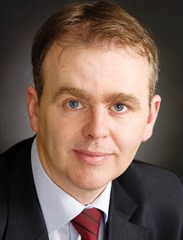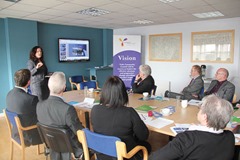A North/South focus in the Oireachtas
 The Oireachtas’ Joint Committee on the Implementation of the Good Friday Agreement focuses on the mutual interests of Northern Ireland and the Republic. Its Chairman, Joe McHugh, outlines how the committee contributes to reconciliation and co-operation.
The Oireachtas’ Joint Committee on the Implementation of the Good Friday Agreement focuses on the mutual interests of Northern Ireland and the Republic. Its Chairman, Joe McHugh, outlines how the committee contributes to reconciliation and co-operation.
“The implementation of agreements is as important as reaching them in the first place … Getting it done is more difficult than getting an agreement to do it.”
So said Senator George Mitchell when he was before the Oireachtas Committee on the Implementation of the Good Friday Agreement last year. The journey towards genuine and lasting peace in Northern Ireland probably has still a long way to travel. We are closer to the beginning than to the middle, never mind the end, of the peace process.
The committee, of which I have the privilege of chairing, is among the most active in Dublin’s parliamentary system, providing a neutral space for discussion on how the gains of the last 15 years can be secured and enhanced.
Our committee membership comprises all shades of political opinion in the Oireachtas from a wide geographic spread and, uniquely, Westminster MPs from constituencies in Northern Ireland have speaking rights at meetings.
A positive, non-partisan atmosphere pervades at meetings, which provides an important forum for informing opinion south of the border on issues facing Northern Ireland.
Reflecting the spirit of the Good Friday Agreement, the committee has been exploring all practical avenues towards its full implementation in its discussions. As well as looking at institutional matters, the committee also considers other issues of common interest such as reconciliation, commemoration and North-South co-operation across sectoral areas.
Bringing the work of our committee beyond the gates of Leinster House, our regular visits to communities north of the border are often acute reminders of how the trauma of the Troubles has lingered, particularly in working class communities. The physical reminders of the divided societies endure in the form of peace walls, while the mental scars remain in what is a contested society. Segregation and sectarianism remain a challenge in Northern Ireland.
As a committee, we are very aware that community work in Northern Ireland is considered to be of the highest standard globally. Our visits have also been aimed at providing solidarity and a listening ear for those community leaders at the vanguard of promoting reconciliation, tolerance and mutual respect between these and other communities across the island. Following up on a series of engagements in East, North and West Belfast, we plan to visit Fermanagh and South Tyrone in the autumn and Derry in the new year.
Youth unemployment
Our visits to Northern Ireland have thrown light on how issues related to educational attainment are impacting on the progress of many communities, with certain parallels in our own constituencies south of the border. Indeed, curbing the scourge of youth unemployment is arguably the biggest challenge facing politicians on both sides of the border.
Recent discussions on unleashing the potential of cross-border education, which included engagement with ministers Ruairí Quinn and Dr Stephen Farry, animated debate on how policy-makers in both Belfast and Dublin can better co-ordinate to deliver for young citizens.
 We have also provided a space for the business community in Northern Ireland and the border region to air their perspectives. Belfast business leaders updated the committee on the difficult trading environment following the flag protests, bringing the message that Belfast remained open for business and is a vibrant and safe city for tourists.
We have also provided a space for the business community in Northern Ireland and the border region to air their perspectives. Belfast business leaders updated the committee on the difficult trading environment following the flag protests, bringing the message that Belfast remained open for business and is a vibrant and safe city for tourists.
A valuable engagement with both the Dundalk and Warrenpoint chambers of commerce made a compelling economic case for the Narrow Water bridge, arguing that the project is fundamentally about people, and not politics. The committee will continue to support all efforts to ensure the realisation of this critical piece of infrastructure.
The committee is also focussing on securing the delivery of other important road projects, not least the upgrade of the A5, a vital piece of road network which will benefit citizens in a number of counties on both sides of the border. We are intent on exploring all potential funding avenues for delivery of a dual carriageway link to the north west by 2020, through political dialogue in Dublin, Belfast, London and Brussels.
The committee regularly engages with North/South bodies, including the Special EU Programmes Body. Over the past 15 years, thousands of community projects have been supported to foster peace and reconciliation and the committee hope that this valuable funding stream can be sustained into the future.
Concluding with Senator Mitchell’s sentiments, “peace and political stability are not too much to ask. They are, in fact, the minimal needs of a decent and caring society.” We hope that our modest work helps to make a practical and common sense contribution to securing the conditions for peace and prosperity on both sides of the border.
Joe McHugh is a Fine Gael TD for Donegal North East.
Committee membership
Chairman: Joe McHugh TD (FG)
Vice-Chairman: Joe O’Reilly TD (FG)
TDs
Seán Conlan (FG)
Seán Crowe (SF)
Clare Daly (United Left)
Regina Doherty (FG)
Frank Feighan (FG)
Martin Ferris (SF)
Luke Flanagan (Ind)
Peter Fitzpatrick (FG)
Michael Kitt (FF)
Aodhán Ó Ríordáin (Lab)
Brendan Smith (FF)
Joanna Tuffy (Lab)
Jack Wall (Lab)
Senators
Maurice Cummins (FG)
Jim D’Arcy (FG)
Mary Moran (Lab)
Mary White (FF)
Clerk: Sinead Quinn





